
Alice O'Toole
Research Interests: Face recognition by humans and machines; neural processing of faces and bodies
Professional Preparation
Brown University - 1988
Brown University - 1985
The Catholic University of America, Washington, DC - 1983
Research Areas
Research Interests
I am a Professor in the Cognition and Neuroscience program at The University of Texas at Dallas. My research interests include perception, memory, and cognition, with special interests in recognition memory for faces. Recent work in my lab is concerned more generally with how we recognize people, both from moving and static displays. We have also developed and tested computational models of face recognition and have tried to link the performance of these models to the characteristics of human performance on similar tasks. Combined, the human memory and computational studies are useful for developing theoretical ideas about how the brain represents the highly complex visual information in human faces.
My research interests include perception, memory, and cognition, with special interests in recognition memory for faces. Recent work in my lab is aimed at understanding how we recognize people, both from moving and static displays. We are also working on comparing human performance on face recognition tasks to the performance of state-of-the-art face recognition algorithms. Another effort in my lab is focused on functional neuroimaging of high level vision, with emphasis on the use of pattern-based classifiers to analyze neural activation patterns.
Publications
Appointments
The University of Texas at Dallas [1999–Present]
The University of Texas at Dallas [1995–1999]
The University of Texas at Dallas [1989–1994]
Universitie de Bourgogne, Dijon, France [1989–Present]
Universitie de Bourgogne, Dijon, France [1988–1988]
Brown University [1985–1988]
Brown University [1983–1984]
Center for Cognitive Science
The Catholic University of America [1982–1983]
Projects
Recognizing moving faces: A psychological and netural synthesis.
2002–2002 O'Toole, A.J., Roark, D. & Abdi, H. (2002). 43rd Annual Meeting of the Psychonomic Society, Kansas City, MO, Nov, 2002.Memory for moving faces: Effects of rigid and non-rigid motion.
2002–2002 Snow, S., Lannen, G., O'Toole, A. J. & Abdi, H. (2002). Vision Sciences Society: 2nd Annual Meeting. Sarasota FL, May, 2002.Recognizing moving faces: A psychological and netural synthesis.
2002–2002 O'Toole, A.J., Roark, D. & Abdi, H. (2002). Vision Sciences Society: 2nd Annual Meeting. Sarasota FL, May, 2002.Exploring face representation in humans and monkeys with high level alter-effects.
2002–2002 Leopold, D. A., Bondar, I. V., O'Toole, A. J. & Logothethis, N. K. (2002).European Conference on Visual Perception, Glasgow Scotland, August, 2002.Prototypereferences shape perception.
2001–2001 O'Toole, A. (2001) Invited Talk, Perceptual Expertise Network Group, Brown University, November, 2001.Additional Information
Personal Statement
My research interests include human perception, memory, and cognition, with an emphasis on computational approaches to modeling human information processing. We are currently examining how face representations created in deep learning convolutional neural networks compare to human face representations.Professional Service
Ad hoc Reviewer (selected, last 3 years):Acta Psychological, Brain & Cognition, British Journal of Developmental Psycholgy, Child Development, Cognitive Psychology, Current Biology, IEEE Transactions on Pattern Analysis and Machine Intelligence, Memory & Cognition, Nature, Nature Neuroscience, Perception, Psychological Science, Science, PloS Biology, Vision Research, Visual Cognition
Associate Editor
British Journal of Psychology
IEEE: Transactions on Biometrics, Behavior, and Identity Science
Recognition/Honors
Postdoctoral Fellow, supported by the French Embassy to the United States, Université de Bourgogne, Dijon, France.Post-Doctoral Fellow, January-July, 1989, Continued funding and joint affiliation, Ecole Nationale Superieure des Télécomrnunications, Paris and Laboratoire de Psychologie, Universitéde Bourgogne, Dijon, France.
Alexander von Humboldt Research Fellow, (Aug., 1994 - Jan.,1995; Aug., 1995 - Jan., 1996), Max Planck Institiit iiir biologische Kybemetik, Tubingen, Germany.
News Articles
Prof Shares Facial Recognition Security Research
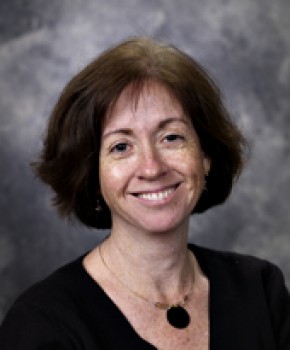 A UT Dallas professor recently presented her research on biometric security technology to officials of the United Kingdom’s Home Office, which oversees the nation’s anti-terrorism and crime-fighting efforts. Dr. Alice O’Toole, a professor of cognitive neuroscience in the School of Behavioral and Brain Sciences, went to London to present her findings at the Biometrics Exhibition and Conference. There, she participated in an international panel discussion of leading-edge applications for biometrics. Biometrics is the measurement of physical characteristics to identify individuals, such as fingerprints, DNA, retinal patterns or facial features. During the October conference, the United Kingdom’s Home Office hosted a smaller meeting for prominent academics and government officials. The Olympics are slated for London in 2012, so security leaders were particularly interested in how biometrics might be used to protect against terrorism or other types of crime, O’Toole said.
A UT Dallas professor recently presented her research on biometric security technology to officials of the United Kingdom’s Home Office, which oversees the nation’s anti-terrorism and crime-fighting efforts. Dr. Alice O’Toole, a professor of cognitive neuroscience in the School of Behavioral and Brain Sciences, went to London to present her findings at the Biometrics Exhibition and Conference. There, she participated in an international panel discussion of leading-edge applications for biometrics. Biometrics is the measurement of physical characteristics to identify individuals, such as fingerprints, DNA, retinal patterns or facial features. During the October conference, the United Kingdom’s Home Office hosted a smaller meeting for prominent academics and government officials. The Olympics are slated for London in 2012, so security leaders were particularly interested in how biometrics might be used to protect against terrorism or other types of crime, O’Toole said.
Research Gives Second Look to Facial Recognition Decisions
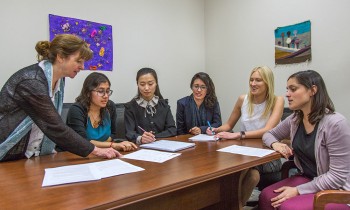 Two heads are better than one — so goes the common adage. But are two heads collaborating really more effective at making decisions than two working independently?
Two heads are better than one — so goes the common adage. But are two heads collaborating really more effective at making decisions than two working independently?When it comes to the task of face recognition, the answer is “no,” according to a study from The University of Texas at Dallas’ Face Perception Research Lab.
Dr. Alice O’Toole, professor in the School of Behavioral and Brain Sciences and holder of the Aage and Margareta Møller Endowed Chair, was senior author of the study published recently in the British Journal of Psychology.
Study Recognizes Value of Forensic Expertise in Facial Identification
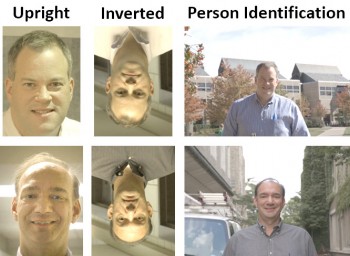 Analysts with training and experience are much better at the forensic art of facial recognition than either computer algorithms or other people, according to a new study co-authored by a UT Dallas professor.
Analysts with training and experience are much better at the forensic art of facial recognition than either computer algorithms or other people, according to a new study co-authored by a UT Dallas professor. Dr. Alice O’Toole, Aage and Margareta Møller Professor in the School of Behavioral and Brain Sciences, said forensics are key to investigations and court cases. She said studies such as this one are important when considering the veracity of evidence in the investigations.
BBS Team Evaluating Facial Recognition Techniques
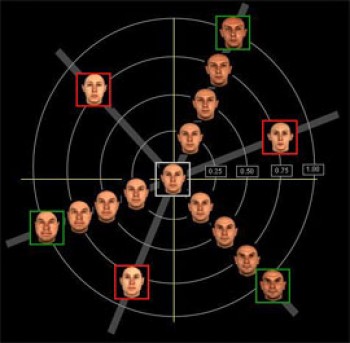 Rapid improvements in facial-recognition software mean airport security workers might one day know with near certainty whether they’re looking at a stressed-out tourist or staring a terrorist in the eye.
Rapid improvements in facial-recognition software mean airport security workers might one day know with near certainty whether they’re looking at a stressed-out tourist or staring a terrorist in the eye.A research team led by Dr. Alice O’Toole, a professor in The University of Texas at Dallas’ School of Behavioral and Brain Sciences, is evaluating how well these rapidly evolving recognition programs work. The researchers are comparing the rates of success for the software to the rates for non-technological, but presumably “expert” human evaluation.
Psychological Study Explores How Bodies Shape First Impressions
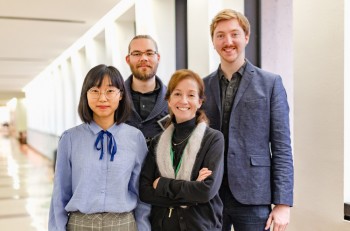 When you first meet someone, it’s likely that you judge their personality based on what little information you have.
When you first meet someone, it’s likely that you judge their personality based on what little information you have.While what we infer from faces has been well studied, new research from The University of Texas at Dallas suggests that people also form first impressions from body shapes.
Ying “Nina” Hu, a doctoral student in the School of Behavioral and Brain Sciences, is the lead author of the study, recently published in Psychological Science, a journal of the Association for Psychological Science. Hu works in the Face Perception Research Lab of Dr. Alice O’Toole, professor of cognition and neuroscience and the Aage and Margareta Møller Professor.